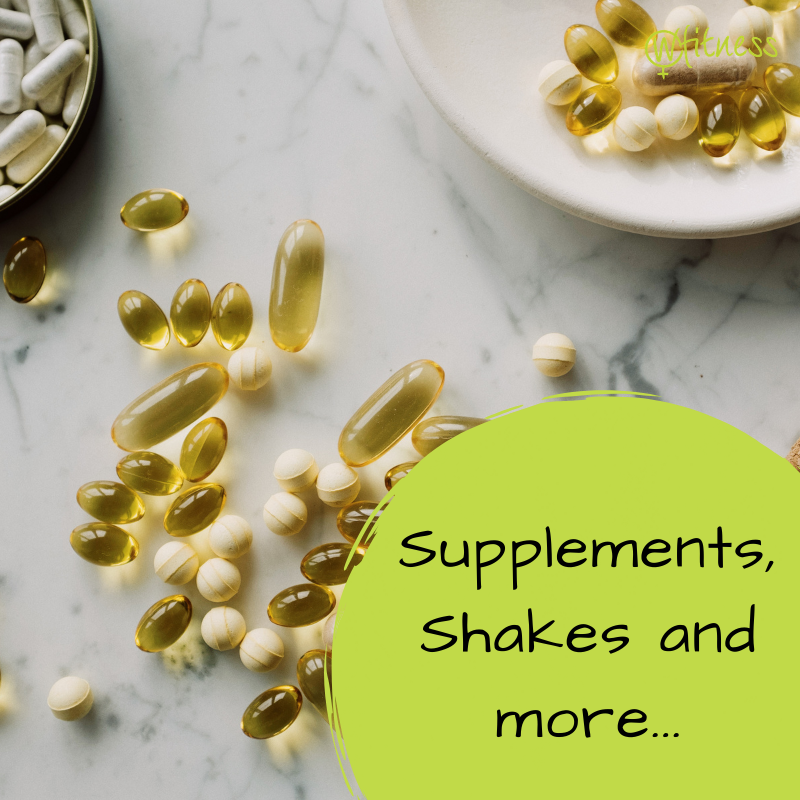If you go on any social media channel, you’re likely to see a Fitness Influencer convincing you to buy some sort of supplement or shake in order to help you reach your body goals. But, do you really need these?
Pre Workout Supplements
A pre-workout is simply a supplement that claims to boost workout performance if you consume it before exercise, and with 4.4 million posts on Instagram with the hashtag “preworkout,” you’d think you’re missing out by not having one. They come as chews, capsules, canned drinks, powders, and colorful liquid in shaker bottles all promising to help you get in a better workout. Lots of people choose to take them with the aim of increasing their 1 rep max on a certain exercise, or just to help them get to the end of their HIIT workout.
All pre-workouts are different, with different ingredients – some promise high carb energy, others are carb and calorie free, but they do tend to have a variety of caffeine, and creatine in them.
If your aim is to achieve high performance personal bests, researching and looking for the best pre-workout for you would be an option. However, if you’re an everyday gym-goer, looking to improve your health and fitness, a simple coffee, like an espresso, before your workout is more than enough (you don’t even need to do this if you don’t want).
Shakes
At W Fitness we do not promote slimming shakes, juice diets or meal replacement shakes of any kind. These are a very unhealthy way to lose weight, and due to the dramatic initial weight loss you will see, you will find you put weight back on quick as well. Healthline Advise: “While people can and do lose weight quickly on very low-calorie (i.e liquid diets), weight regain is extremely common. This makes sense, since drinking liquid meals doesn’t foster healthy eating habits, which are necessary for successful weight maintenance. In addition, research suggests that following a liquid-based weight loss plan may lead to disordered eating, such as binge eating or food restriction.
BCAA Supplememts
There are so many supplements out there that are sold as ‘must have’ for getting results in the gym, one being BCAAs. BCAA stands for Branched-Chain Amino Acids, and there are 20 amino acids that the body needs to make up thousands of different proteins. 9 of these 20 are considered essential as they cannot be produced by the body itself (so you have to get them from elsewhere). Everyone needs BCAAs but in relation to exercise, these BCAAs are needed to increase muscle growth, decrease muscle soreness, reduce exercise fatigue, and prevent muscle wasting (ie when protein breakdown exceeds muscle protein synthesis).
But do you need a supplement? Usually, no.
If you have a healthy diet and consume enough protein it is unnecessary to have BCAA supplements (plus, consuming protein rich foods will also provide you with other important nutrients that the BCAA supplements lack). These food sourcs include:
- Meat, Poultry and Fish
- Eggs
- Dairy Products (such as milk, cheese and yogurt)
- Nuts and Seeds
- Soy Products
- Legumes, including beans, peas and lentils
Health Supplements
We would always advise that you speak to a nutritionist or dietician regarding any specific supplements you need as everyone is different. This is particularly important if you have a restricted diet, such as, veganism, vegetarianism, or any dietary allergies etc.
If you have a healthy balanced diet, you should be getting all the nutrients that you need, and taking too much of a supplement, or taking it for for too long could be harmful.
The only heath supplememt that the NHS recommends every adult to take is vitamin D. They state: “From around late March or early April until the end of September, most people can get all the vitamin D they need through sunlight on their skin and from eating a balanced diet. However, during the autumn and winter, you need to get vitamin D from your diet because the sun is not strong enough for your body to make vitamin D. Because it’s difficult for people to get enough vitamin D from food alone, everyone (including pregnant and breastfeeding women) should consider taking a daily supplement containing 10 micrograms of vitamin D during the autumn and winter”. It is important to note that some groups of the population are at greater risk of not getting enough vitamin D and are advised to take a supplement every day of the year – you can discuss with your doctor if you believe you are at greater risk.
How can I improve my workout?
After exercise, make sure that you are having a protein based meal within 30-60 minutes. This is important because when you eat protein, your body breaks the protein down into amino acids. Those amino acids are then used to repair and grow new muscle fibers. Foods high in protein include:
- Chicken
- Fish, including: salmon, cod, haddock, tuna,
- Dairy, including: eggs, greek yogurt, and cheese
- Hemp Seeds
If you do struggle to get the protein you need after a workout, protein powders are fine to add to smoothies, greek yogurt and porridge but make sure that you pick a low sugar variety – some are really high in sugar. However, choosing a high protein food over a power is always more beneficial.
